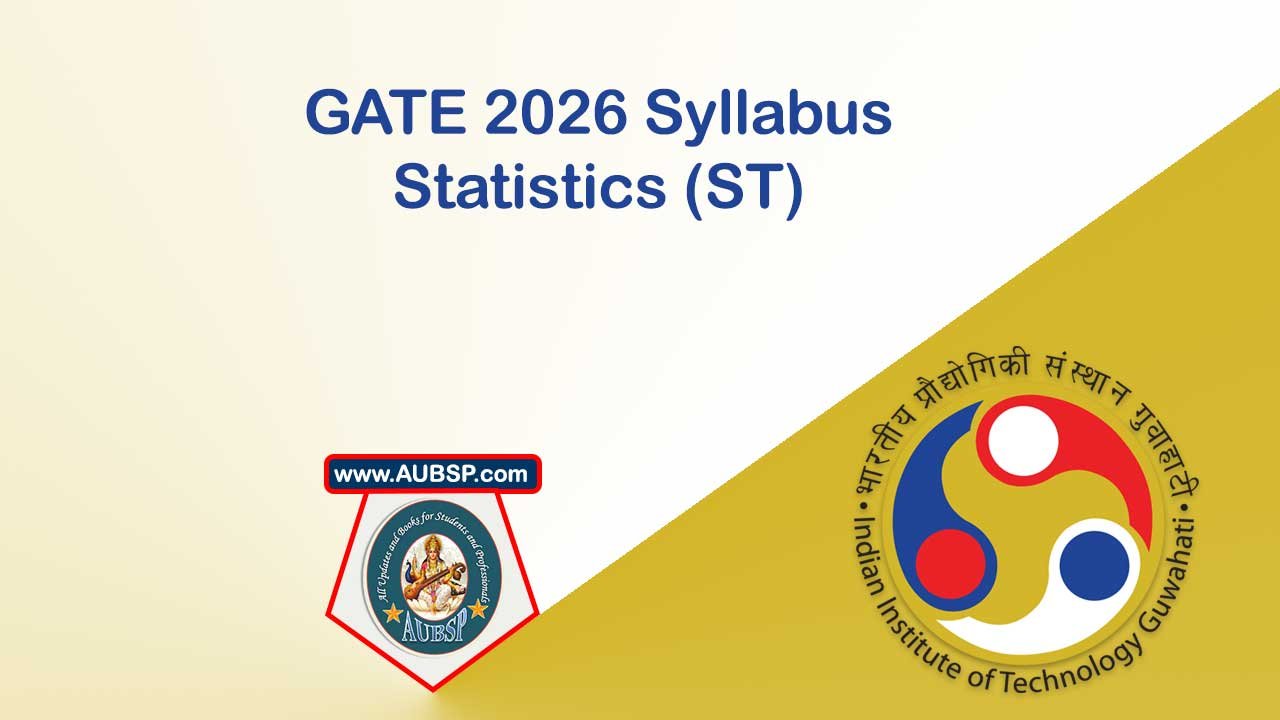GATE Syllabus 2026 for ST Paper: The Indian Institute of Technology (IIT) Guwahati (iitg.ac.in), the organising institute officially released complete syllabus of Statistics (ST) Paper for GATE 2026 exams.
The syllabus of paper ST (Statistics) has been divided into ten sections. The corresponding sections of the question paper contain different topics.
You may download GATE admit card and GATE exam schedule for paper Statistics for appearing in the Graduate Aptitude Test in Engineering for the year 2026.
GATE 2026 Paper Pattern for Statistics:
| Paper | Statistics |
|---|---|
| Paper Code | ST |
| Examination Mode | Computer Based Test (CBT) |
| Duration | 3 Hours (180 Minutes) |
| Type of Questions | (a) Multiple Choice Questions (MCQ) (b) Multiple Select Questions (MSQ) and/or Numerical Answer Type (NAT) Questions |
| Marking Scheme | Questions carry 1 mark and 2 marks |
| Negative Marking | For a wrong answer chosen in a MCQ, there will be negative marking. For 1-mark MCQ: 1/3 mark will be deducted for a wrong answer. For 2-mark MCQ: 2/3 mark will be deducted for a wrong answer. NO negative marking for MSQ & NAT. |
| Number of Questions | 10 (GA) + 55 (subject) = 65 Questions |
| General Aptitude (GA) Marks | 15 Marks |
| Engineering Mathematics | 13 Marks |
| Subject Questions | 72 Marks |
| Total Marks | 100 Marks |
GATE Syllabus for Statistics
Calculus: Finite, countable and uncountable sets; Real number system as a complete ordered field, Archimedean property; Sequences of real numbers, convergence of sequences, bounded sequences, monotonic sequences, Cauchy criterion for convergence; Series of real numbers, convergence, tests of convergence, alternating series, absolute and conditional convergence; Power series and radius of convergence; Functions of a real variable: Limit, continuity, monotone functions, uniform continuity, differentiability, Rolle’s theorem, mean value theorems, Taylor’s theorem, L’ Hospital rules, maxima and minima, Riemann integration and its properties, improper integrals; Functions of several real variables: Limit, continuity, partial derivatives, directional derivatives, gradient, Taylor’s theorem, total derivative, maxima and minima, saddle point, method of Lagrange multipliers, double and triple integrals and their applications.
Matrix Theory: Subspaces of Rnn and Cnn, span, linear independence, basis and dimension, row space and column space of a matrix, rank and nullity, row reduced echelon form, trace and determinant, inverse of a matrix, systems of linear equations; Inner products in Rnn and Cnn, Gram-Schmidt orthonormalization; Eigenvalues and eigenvectors, characteristic polynomial, Cayley-Hamilton theorem, symmetric, skew-symmetric, Hermitian, skew-Hermitian, orthogonal, unitary matrices and their eigenvalues, change of basis matrix, equivalence and similarity, diagonalizability, positive definite and positive semi-definite matrices and their properties, quadratic forms, singular value
decomposition.
Probability: Axiomatic definition of probability, properties of probability function, conditional probability, Bayes’ theorem, independence of events; Random variables and their distributions, distribution function, probability mass function, probability density function and their properties, expectation, moments and moment generating function, quantiles, distribution of functions of a random variable, Chebyshev, Markov and Jensen inequalities.
Standard discrete and continuous univariate distributions: Bernoulli, binomial, geometric, negative binomial, hypergeometric, discrete uniform, Poisson, continuous uniform, exponential, gamma, beta, Weibull, normal.
Jointly distributed random variables and their distribution functions, probability mass function, probability density function and their properties, marginal and conditional distributions, conditional expectation and moments, product moments, simple correlation coefficient, joint moment generating function, independence of random variables, functions of random vector and their distributions, distributions of order statistics, joint and marginal distributions of order statistics; multinomial distribution, bivariate normal distribution, sampling distributions: central, chi-square, central t, and central F distributions.
Convergence in distribution, convergence in probability, convergence almost surely, convergence in r-th mean and their inter-relations, Slutsky’s lemma, Borel-Cantelli lemma; weak and strong laws of large numbers; central limit theorem for i.i.d. random variables, delta method.
Stochastic Processes: Markov chains with finite and countable state space, classification of states, limiting behaviour of n-step transition probabilities, stationary distribution, Poisson process, birthand-death process, pure-birth process, pure-death process, Brownian motion and its basic properties.
Estimation: Sufficiency, minimal sufficiency, factorization theorem, completeness, completeness of exponential families, ancillary statistic, Basu’s theorem and its applications, unbiased estimation, uniformly minimum variance unbiased estimation, Rao-Blackwell theorem, Lehmann-Scheffe theorem, Cramer-Rao inequality, consistent estimators, method of moments estimators, method of maximum likelihood estimators and their properties; Interval estimation: pivotal quantities and confidence intervals based on them, coverage probability.
Testing of Hypotheses: Neyman-Pearson lemma, most powerful tests, monotone likelihood ratio (MLR) property, uniformly most powerful tests, uniformly most powerful tests for families having MLR property, uniformly most powerful unbiased tests, uniformly most powerful unbiased tests for exponential families, likelihood ratio tests, large sample tests. Non-parametric Statistics: Empirical distribution function and its properties, goodness of fit tests, chisquare test, Kolmogorov-Smirnov test, sign test, Wilcoxon signed rank test, Mann-Whitney U-test, rank correlation coefficients of Spearman and Kendall.
Multivariate Analysis: Multivariate normal distribution: properties, conditional and marginal distributions, maximum likelihood estimation of mean vector and dispersion matrix, Hotelling’s T2 test, Wishart distribution and its basic properties, multiple and partial correlation coefficients and their basic properties.
Regression Analysis: Simple and multiple linear regression, R2 and adjusted R2 and their applications, distributions of quadratic forms of random vectors: Fisher-Cochran theorem, Gauss-Markov theorem, tests for regression coefficients, confidence intervals.
You may download complete GATE syllabus 2026 for ST Statistics in PDF. For more detail, please visit official website GATE2026.IITg.ac.in.


